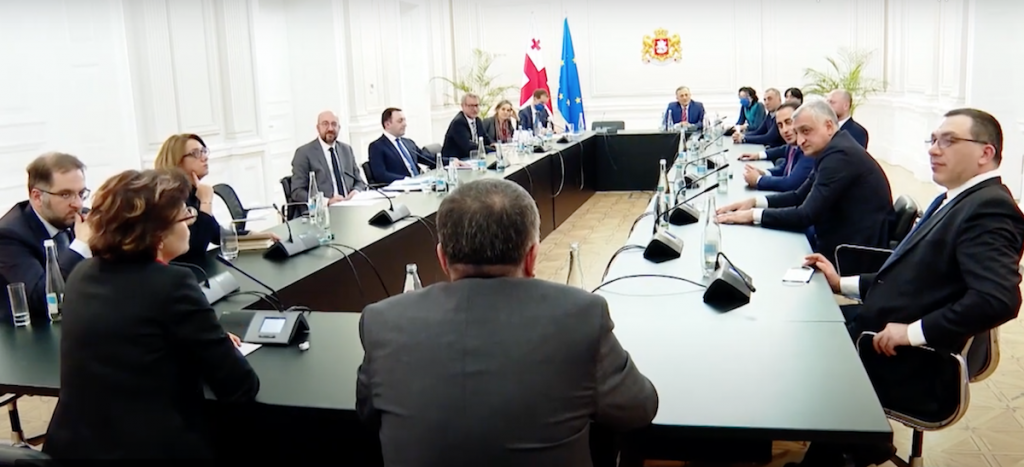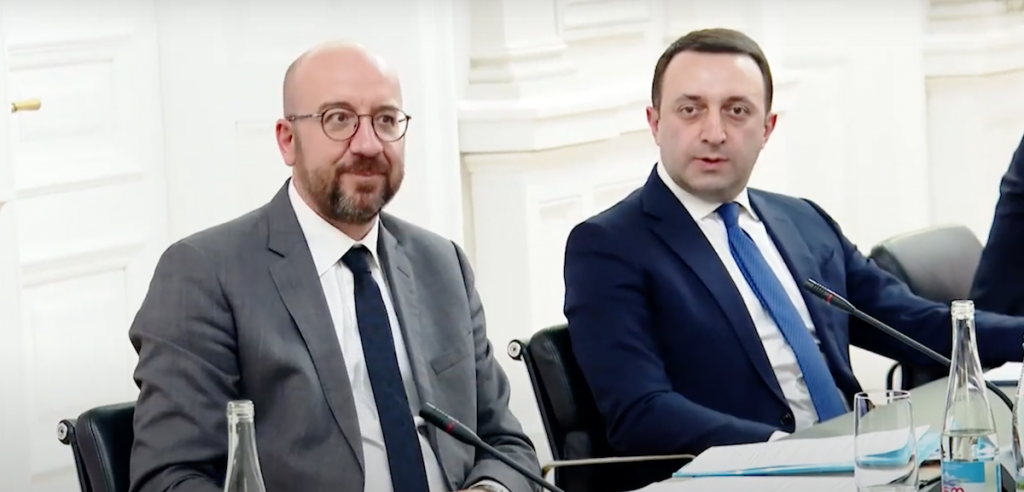Georgian opposition, gov’t relaunch dialogue
Dialogue has resumed between the Georgian authorities and the opposition, which have been involved in a deep political standoff since the arrest in February of opposition leader Nika Melia.
The first round of negotiations in 2021 lasted until the night of March 1, and was organized through the mediation of the President of the European Council, the leaders of all opposition parties participated in it but only Prime Minister Irakli Garibashvili was present from the government.
The meeting took place in the presidential palace, but Salome Zurabishvili herself did not participate.
The head of the ruling Georgian Dream party, Irakli Kobakhidze, also did not participate, although in the four previous rounds of negotiations he was the main speaker from the government side.
The political crisis in Georgia began immediately after the parliamentary elections on October 31, 2020. The entire united opposition declared them to be falsified and demanded that new elections be held. The overwhelming majority of opposition MPs resigned from their seats in parliament.
In 2020, the US Embassy in Georgia acted as a mediator in negotiations between the government and the opposition. This time, the meeting of the opposing sides was unexpectedly announced by the President of the European Council Charles Michel, who was in Tbilisi on an official visit, after his meeting with the prime minister.
“I call on all parties to mitigate the escalation and to join forces to engage in political dialogue. It’s time to move from facilitation to mediation. I repeat, it’s time for a political dialogue,” said Charles Michel.
The dialogue will continue with the mediation of European diplomats, and the next round may take place in Brussels.
The opposition’s demands remain unchanged: the release of political prisoners Nika Melia and Giorgi Rurua and early elections.
- Georgia’s political crisis – explained
- The Georgian opposition’s plans to take over the streets in March
- ‘Georgia’s place in European society is under threat’ – Western politicians

Six main issues in the dispute between the authorities and the opposition in Georgia
“This meeting does not mean that everything has been decided and that political parties no longer have difficult issues to discuss with the government. But I am proud that an important step has been taken in the right direction,” said the head of the European Council at the end of the meeting.
“When I asked political parties if they have the political will to strengthen the political dialogue in order to jointly search for solutions, the answer was unequivocal – yes. This is an important step and we will continue to support positive efforts.”
Zurab Japaridze, founder of the Girchi – More Freedom opposition party, told Formula TV that six main issues were discussed at the negotiating table.
- Large-scale electoral reform to consolidate democracy in Georgia
- Possible early elections / preparation for future elections with local governments
- Judicial reform to ensure the rule of law in Georgia, including the appointment of Supreme Court judges and elections to the High Council of Justice
- Reforms to strengthen the fight against corruption
- Political justice / political prisoners issue
- Fair redistribution of roles and responsibilities in parliament
Salome Samadashvili, one of the leaders of the opposition United National Movement party, called the main outcome the very fact of the resumption of the dialogue.
Prime Minister Irakli Garibashvili, commenting on the meeting, said that it was held in a constructive manner, the parties agreed to continue the dialogue.
“The European Council urges us to find a common language as soon as possible. The unification should take place on the issues that most concern the population of Georgia, and this is, first of all, the occupation [of the lands of Georgia by Russia], poverty, the Covid-19 pandemic. For our part, we confirm our full readiness to continue the dialogue,” Garibashvili said.
The head of the European Council Charles Michel visited Tbilisi as part of a tour of Eastern Europe. He has already visited Moldova and is now heading to Ukraine.
The European Council is the main political body of the European Union. The Council includes only the leaders of the EU countries. The European Council determines the main development strategy and policy of the European Union. The President of the European Council is one of the highest officials of the European Union.
Arriving in Tbilisi, Charles Michel said that the political crisis in Georgia worries both the European Union and him personally. On behalf of the European Union, he called on the parties to work towards a way out of the crisis.
In Tbilisi, Charles Michel met with the President and Prime Minister, as well as with opposition leaders.



















